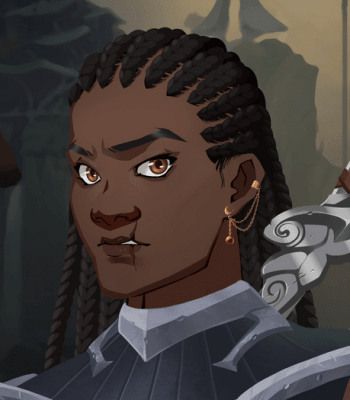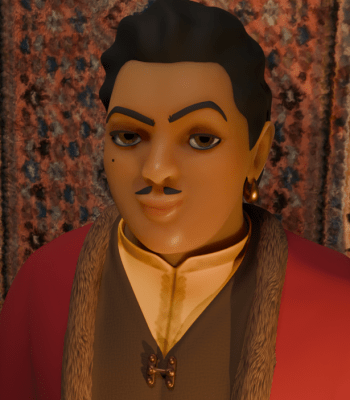Hello!
So, as most of you know, Avaria is thematically a historically-flavored world with many kinds of prejudices. Most cultures are sexist in some way or other, heritages come with bigotries most of the time, and there is widespread homophobia (albeit relatively mild, insofar as no one is going to be imprisoned, exposed to serious physical harm, or executed for it). Transphobia is less of an issue due to the dearth of trans people as an existing cultural phenomena, and to the fact that the majority of people who would disguise themselves as another gender do so quietly without notice. (Edit: I didn't want to delete this paragraph because it seems deceitful to do so, but I apologize that this came across like trans erasure. As noted below in the original post, trans people do exist in this world. There aren't medical procedures to support medical transitions, and it's not a well-established social undertaking for personal identity reasons as much as it is a temporary career choice like in the case of kuchak dancers. That doesn't mean that trans people can't exist in this world -- they can, and they already do. We have mechanics precisely to support representation like this. This sentence meant that while the background populace of the Caliphate completely recognizes that homosexuality exists as a cultural phenomena, people might be more confused about transexuality -- they recognize that people cross-dress sometimes, but the idea of choosing personal gender identity is more remote from the most common mindsets. Still, we're working on subsocieties where it's more understood.)
Most of this bigotry is somewhat toned down from what it might have been in the real world, but it does exist as material for telling stories of realistic strife and struggle. The majority of Avarians are not what we would consider a socially enlightened bunch, even where they mean well, and prejudices of varying kinds do tend to color people's perceptions and behaviors. We've addressed some of these prejudices elsewhere, but here are some pointers specifically about gender fluidity, which we haven't touched on fully yet in alpha.
Points:
- In the world of Avaria, most NPCs will assume that you are either a man or a woman, and address you according to those assumptions.
- You might be a man dressed as a woman, and the NPC will call you 'aunt' or something similar.
- You might be intersex, dressed in a completely gender-neutral style, and the NPC will randomly choose to call you either 'aunt' or 'uncle'.
- Most PCs will have no concept of being 'non-binary', and even if they were intersex at birth, would choose one gender to typically present themselves as.
- Some PCs may find this norm to be stifling, and deeply wish to be seen as neither male or female, but it would certainly be an odd idea both to themselves and anyone else. They might hear rumors of other peoples among whom something else is possible, and find such a notion strange but enticing.
- When encountering a PC of ambiguous gender, the thematic thing to do is for your character to assume that they are either male or female and address them accordingly. Feel free to roleplay surprise about finding out the opposite, or confusion about whatever ideas the PC has! The whole point is being able to roleplay these struggles.
- There are some cultures in Avaria where notions of third genders exist, but these genders often still have their own specific cultural roles, or may be considered vaguely reprehensible by so-called "ordinary" people.
Thematic gender fluidity might look like:
- Not having any identification with either gender particularly, and often switching back and forth in terms of presenting as either a man or a woman.
- Being assigned a gender at birth, but tending to present as the other gender just due to feeling more comfortable that way. (It's not gender fluidity exactly if the character is presenting in a certain way in order to achieve a goal, such as a woman disguising herself as a man in order to join a males-only warrior society.)
- Feeling an internal rejection of traditional gender roles and having the sense of not fitting in with them in a really fundamental way.
- Having any sort of internal feelings or ideas that challenge or question standard gender roles and identity, but knowing that the world is largely hostile to such thoughts and feelings.
- Regardless of those feelings, behaving in a socially-sanctioned way if attempting to avoid thematic consequences -- or refusing to do that, and embracing the consequences.
- Possessing backstory to explain why the gender fluid character thinks and acts the way they do, and outlining what struggles they have faced so far and might expect to face in the future.
Other Sexuality/Gender Themes:
- Most characters will not tend to look too kindly upon relations outside of marriage. Among 'decent' sorts, the ideal is that you'd get married, and sex outside of marriage would be considered bad for many reasons. Because of this, a bastard -- even a common bastard -- might be ashamed of themselves, a single mom is going through some serious thematic struggles, and if people get wind of unmarried men and women being close, even if there is nothing intimate involved, those people may start to suspect and gossip.
- In general, people in the caliphate especially tend to be publicly discreet in their relationships with others -- even among same-sex married couples, really ostentatious physical affection in public would tend to be considered eccentric if not distasteful.
- Homosexuality would be considered something to keep private, and people might be disgusted by the idea of it and insult each other with homophobic insults. Somewhat less conservative attitudes can be found among some people in large cities, but discretion is still generally advised and practiced.
- The fact that couples in general tend to be discreet and unostentatious, and friends often show more public affection than couples, can be helpful in muddying the waters around all kinds of relationships. A homosexual couple would also not necessarily consider it all that oppressive to not be able to be physically affectionate with one another in public.
- Crossdressing and gender fluidity do exist in certain marginally socially approved roles, especially (in the caliphate) in the case of kuchek dancers (male bellydancers) and related acting/performing roles. While such persons have some degree of acceptance as performers and may be celebrated among certain circles, they are considered generally disreputable and dissolute among wider "respectable" society.
- It would be considered a possible invitation for trouble (and certainly odd) for someone to be presenting themselves regularly as the opposite gender, especially with no goal-oriented reason for doing so.
As always, please recognize that when your character is pushing back against another PC's non-cis/binary expression of sexuality or gender, this is fully thematic -- but your character may eventually hope to evolve past such closeminded perspectives! This sort of antagonism must be handled with maturity, and always with the OOC understanding that treating another person in a bigoted manner is a real character flaw. Conflict is fine, but no PC should be persistently harassing another over thematic prejudices. Likewise, players who design characters that express themselves in a manner that flouts thematic norms should be doing so because they want to roleplay the struggle, and are capable of handling these conflicts with maturity. They shouldn't be flouting norms with the expectation that they can simply ignore them and that their behavior will be overlooked.
So when you come across a PC whose pronouns are showing up as 'they/them' -- imagine how your character would react, in the setting, and how they might classify that PC. Does your PC automatically assume that default humans are 'he'? Is the behavior of the nonbinary PC feminine to the degree that your character assumes they're a woman? Are they just unsettling, to the degree that your PC avoids them, or demands to know their gender outright? Misgendering someone in this situation is not considered to be harassment -- it's just thematic to assume -- but bullying them verbally or physically over some expression of themselves would be considered harassment, though, so undertake that antagonistic roleplay with maturity and willingness to back away if someone issues an X-Card.
(Note: Do not ask a player their gender, or their PC's gender, OOCly please. It's fine to refer to players OOCly as 'them' or 'they' if you're not sure.)
We love to see players roleplaying through struggle and conflict; we have themes that may be difficult, for the sake of being able to tell these stories. Avaria isn't meant as a refuge where people can avoid all the discomforts and cruelties of the real/historical world. It's more of a place to explore them in a space that is, relatively speaking, still safe -- and, sometimes, to push back against them. Mindfully playing out resistance to bigotry in a thematic way -- whether that bigotry revolves around sexuality and gender identity, class prejudice, ethnic animosity, or anything else -- is something we're actually happy to see. Such efforts have the potential to make small but real differences in the game world! But at the same time, it's good to keep in mind that PCs may start with a lot of their own prejudices simply due to the cultural milieu they exist in, and this is realistic for the setting.
Of course, we'd like to have characters largely behave in thematic ways, unless they have substantial story background that would explain their having developed a more modern perspective on a particular issue.






